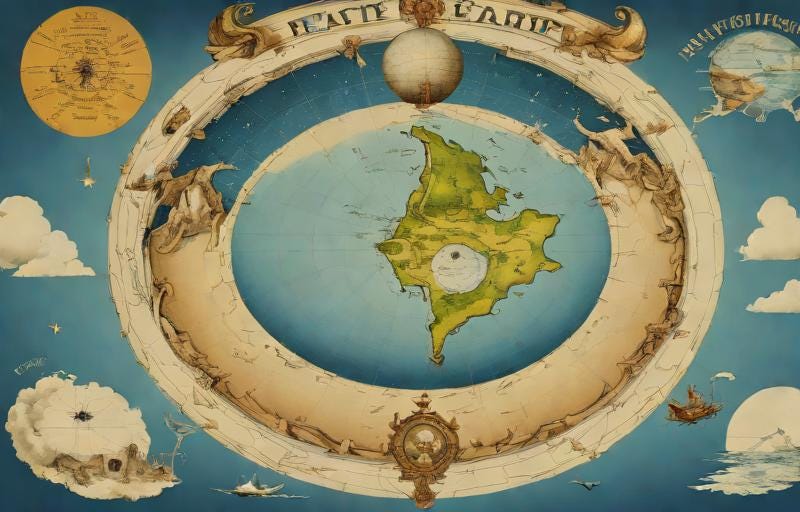What is Deconstruction and Why It Matters
And how to deconstruct your worldview
Hi Thinkers!
Welcome to the Deconstruction.Zone newsletter! Thank you for reading.
Today we’ll discuss deconstruction: what it is, why it matters, and how to evaluate your own worldview honestly.
Be sure to subscribe so you don’t miss the next post, “The 3 B’s of Religion”, which will be followed by “Jesus Taught Deconstruction — and the Religious Hated Him for It”. And check out the last post: “Why Faith Can’t be Used as Evidence for Belief”.
Now let’s get started!
I was shocked as I stared at the details of the proposed homeowners insurance policy this agent had presented through my Gmail inbox.
My wife and I were scrambling to close on our first home within the 30 days allotted - so I almost didn’t open up the insurance policy - just assuming the $1200/year was the norm and acceptable. And hey, we need homeowners insurance to receive the mortgage!
But I thought, perhaps, I could increase our deductible and save a hundred dollars per year.
So I opened the quote and started reading through it. There were all kinds of unnecessary riders included with this policy!
Insurance for animal attacks on your property (we were on a quarter acre lot in a neighborhood and had no pets): $50/year.
Identity theft protection (if you use credit cards to make your purchases, this is already covered): $100/year.
Insurance for mold damage up to $10,000 in repairs (with a $5,000 deductible, so a very small window of benefit): $75/year.
In total, after going through and cutting out these irrelevant expenses and modifying this policy to fit our needs, I reduced our total policy from $1200/year to $600/year.
Considering my income was low at the time, and my wife was in school, that extra $50/month was incredibly valuable. We could actually go out for an occasional date night!
What is Deconstruction?
Most of us take our worldview how I almost took this insurance policy - exactly as it’s handed to us.
We don’t question. Because it gives us what we need to make it through the day, we accept it in its entirety.
But just because something looks nice on a superficial level doesn’t mean we should accept it without further evaluation.
On the show Arrested Development, the Bernie Madoff-type patriarch goes to prison for fraud, leaving the rest of his family broke and living in the model home for an undeveloped neighborhood.
While this home looks beautiful, it was built for show and not functionality — and the early episodes show the family perpetually struggling with the broken and non-functioning parts of the house. What appeared impressive at first glance, fails to withstand scrutiny and deeper inspection.
This is exactly what worldview deconstruction is all about: taking a topic and, instead of accepting it all as a packaged insurance policy or flawless house, evaluating each individual aspect to ensure it holds up and meets your needs.
It’s taking apart the wall, brick by brick. Inspecting each brick to ensure it’s well made and safe to use as a foundation for the next level of bricks. If one brick doesn’t seem to hold up or fit, you set it aside for further inspection — potentially leaving it out of your wall permanently.
Deconstruction matters if we claim to care about truth
Just because someone else told me this is what I need doesn’t make it true.
In fact, the only people who will tell you not to seek information beyond what they share are con artists and cult founders.
Particularly when the person declaring you “need” something benefits financially or otherwise from you accepting that belief (like an insurance agent increasing your coverage or a preacher declaring the benefits of tithing), it’s essential to closely evaluate their claims.
Truth can always hold up under close inspection. Anyone who tells you otherwise is selling you a lie.
And if I want to be a person of integrity, I must do everything I can to know the “why” behind my beliefs and actions - especially if I’m going to present them to others as truth, or act in a way where others are impacted by this worldview.
Before I vote on a topic like abortion, immigration, gay marriage, or universal healthcare, I need to make sure that my views are built on a strong foundation — because my actions can have life or death consequences for others.
By periodically reviewing what I hold to be true, and changing my beliefs as I gain new knowledge, I become a role model others can follow. Instead of telling other people to stop living how they were raised and start living how I was raised, I can invite them to join me on a journey of continual discovery as we seek truth together.
Deconstruction can be difficult and uncomfortable, but it’s one of the most valuable activities for anyone who desires to be a person of integrity with actions that align with truth. And we’ve been called to deconstruction by the sharpest minds throughout history — including Jesus, who we will discuss in a couple of weeks.
How to deconstruct your worldview
Deconstructing your worldview doesn’t mean giving up everything you once held to be true. It means honestly evaluating the “why” behind your beliefs and recognizing any shortcomings.
So how do you go about deconstructing your worldview?
First, you must give yourself permission to be critical.
Then, you must ask yourself what assumptions each of your beliefs is built on, and start validating those assumptions by confirming they have legitimate support behind them.
For example, far too many Americans believe in a Flat Earth. What assumptions must this belief be built on?
There is a group of global leaders who have a tremendous amount of wealth and power and want you to believe the world is round (because somehow that benefits them).
Every astronomer and physicist at the thousands of universities around the world are either deceived or lying — despite spending their entire careers studying this topic.
Countries around the world are willing to invest billions of dollars into NASA and other space programs to maintain this lie — even when those countries find themselves at war with each other. They’re paying graphic designers and computer artists to fabricate a perpetual collection of images from space.
Our telecommunications companies like Verizon and AT&T are lying to us about the satellites being used for our phone GPS navigation.
Airlines are lying about their flight paths.
The thousands of leisure sailors who circumnavigate the globe by ship every year are either lying or deceived.
And this is just scratching the surface of the assumptions that need to be made to hold this belief! Yet many people have embraced it whole-heartedly.
We’ll talk about conspiracies in the future, but for now we’ll just quote Carl Sagan and say “extraordinary claims require extraordinary evidence.”
Once we have our list of assumptions, we then start diving into each one of those to see what evidence they are built on. If the entire belief in a Flat Earth is dependent on a global cabal of powerful people determined to deceive us, then we need to spend a lot more time evaluating that claim before we just accept that the world has an edge!
As you start to do this with your views, both large and small, you become someone who can eloquently speak to what they believe, while gaining an open-minded perspective toward others — recognizing we all believe false claims until presented with new information and experiences in a compelling manner.
Conclusion: The world would be a better place if more people deconstructed
Our identities are often tied up in our worldviews. And this makes it incredibly difficult for us to take an open-minded approach to being curious about these strongly held beliefs. We’re afraid that, if we question too much, we’ll find out their wrong — and then we’ll be stuck rudderless in the ocean of life.
But fear is never a reason to choose ignorance. And the good news is, humans are resilient — and there is something incredibly rewarding and freeing that comes from transitioning your worldview and continuing to thrive.
With every change you make to your worldview after deliberate inspection, you grow closer to the truth.
And when we recognize that we don’t have all of the answers, we can become more forgiving and accepting of others. As Charles Darwin wrote, “Ignorance more frequently begets confidence than does knowledge”. By identifying our own shortcomings in the past, we can gain a deeper sense of humility and become more accepting of others today.
Yes, a world where we all deconstructed our worldviews through deep introspection and study would be a world with more joy, love, and acceptance.
I hope you have a desire to join me in pursuing truth and making the world a better place. If you do, let’s remember the words of Mahatma Gandhi: “If you want to change the world, start with yourself.”
Thoughts? I would love to hear your view on deconstruction and how it impacts our lives for better or worse. You can use the comments below to help expand the dialogue — I welcome both agreement and debate in a desire to pursue truth.
Thanks for reading. Until next time, stay inspired!


